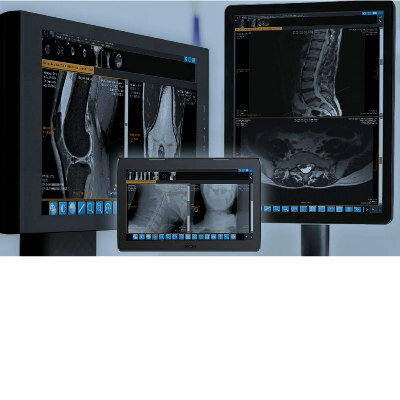High-Field Postmortem MRI a Feasible and Less Invasive Alternative to Conventional Fetal Autopsy
By MedImaging International staff writers
Posted on 26 Aug 2009
Whole-body high-field magnetic resonance imaging (MRI) is an effective alternative to postmortem examination of human fetuses and may provide a less invasive option for traditional autopsy.Posted on 26 Aug 2009
Examination after death can provide important information about why a fetus did not survive and help to evaluate the accuracy of diagnostic methods in utero and the risk to future pregnancies. This information is chiefly obtained from autopsies. However, over the past decade--after incidents raised public suspicion about autopsies--there has been a considerable decline in the number of parents agreeing to an autopsy. This has prompted research into less invasive methods of postmortem.
Conventional whole-body MRI at 1.5 T was thought to offer the most practical alternative, but have been shown to provide inadequate image quality of small fetuses. In contrast, high-field (9.4 T) whole-body MRI provides good images and has shown promising results in small animals, but has not been performed in humans.
Dr. Sudhin Thayyil, from UCL Institute of Child Health and Great Ormond Street Hospital (London, UK), and colleagues examined the feasibility of high-field MRI and compared the diagnostic usefulness of high-field MRI with conventional MRI and traditional invasive autopsy in small human fetuses.
Whole-body MRI at 9.4 T and 1.5 T was performed on 18 fetuses of less than 22 weeks' gestation before doing a conventional invasive autopsy. Images from the MRI were compared with the findings of invasive autopsy in a blinded manner and assessed for diagnostic accuracy and image quality by a team of specialist pediatric radiologists.
Overall, traditional invasive autopsy did not provide superior diagnostic accuracy compared to high-field MRI in any of the examinations, and in some cases, the high-field MRI provided more information than the invasive autopsy. Spatial resolution, tissue contrast, and image quality for all organ systems were much better with high-field MRI than with conventional MRI. Moreover, all structural abnormalities detected by traditional invasive autopsy and internal examination of visceral organs were also detected with high-field MRI. In contrast, conventional MRI was found not diagnostically useful in 78% of cases.
The investigators, who published their study's findings in the August 8, 2009, issue of the Lancet, stated, "In the future specialist pathologists might be able to offer a two-stage postmortem process to parents, whereby an MRI at 9.4 T plus information from all other noninvasive tests…is done first, and then, if needed, a targeted internal examination of the body is done [minimally invasive autopsy]. Alternatively, this form of autopsy might be offered to parents who refuse conventional autopsy…such an approach might increase autopsy rates and bring back postmortem research in the UK.”
However, the researchers cautioned that these are very early data and further evidence from large prospective studies is required before minimally invasive autopsy can be offered routinely in clinical practice.
In an accompanying comment in the same issue of Lancet, Dr. Elspeth Whitby from the University of Sheffield (UK) and Dr. Marta Cohen from Sheffield Children's Hospital, (UK) highlight several practical problems that they reported that need to be addressed if postmortem MRI is to have a significant role in the future. These include limited access to MRI scanners, a service already stretched in the United Kingdom; and availability of specialists to perform the scans and interpret the images when there is already a worldwide shortage of radiologists.
Related Links:
UCL Institute of Child Health and Great Ormond Street Hospital













